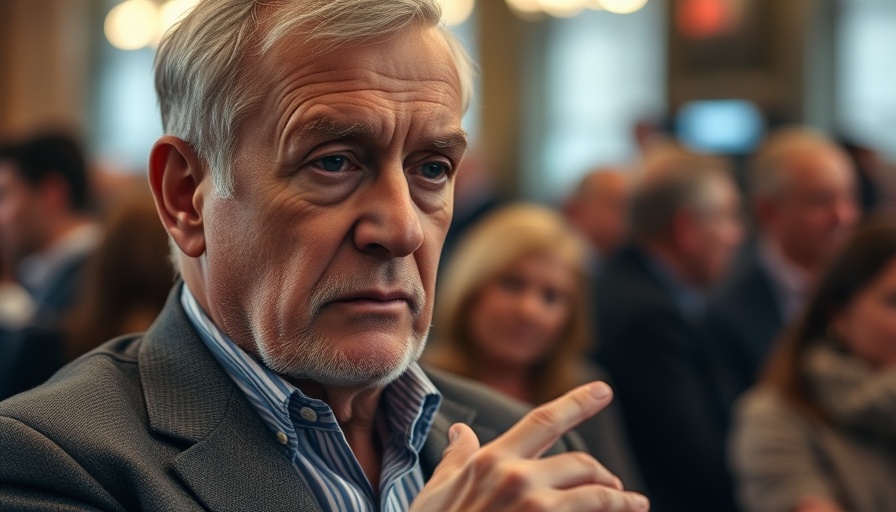
Trump's Sanction Threats: A Shift in U.S.-Russia Dynamics
In a bold move following Russia’s aggressive military actions in Ukraine, former President Donald Trump has threatened economic penalties against Russia, including sanctions and tariffs, until a peace agreement with Ukraine is reached. During a recent Oval Office press conference, Trump emphasized the need for immediate dialogue between the two nations, urging them to come to the negotiation table before the situation escalates further.
The Context of Conflict: Ukraine's Struggles Against Russian Aggression
The backdrop of Trump’s statements is a troubling escalation in the Ukraine conflict, marked by a recent surge of Russian attacks that has reportedly included over 260 missiles aimed at critical infrastructure. The Ukrainian President, Volodymyr Zelenskyy, has stressed that these actions are not only harmful to his country but detrimental to peace efforts. Trump noted that while he believes Vladimir Putin could exhibit more flexibility in negotiations, the situation for Ukraine is increasingly dire.
America's role in this conflict, somewhat ambiguous under the Biden administration, was pointedly highlighted when Trump expressed a preference for dealing with Russia over Ukraine, claiming that the latter lacks the necessary leverage in negotiations. His unexpected comments have reignited debate over U.S. foreign policy and the efficacy of sanctions as a tool for peace.
Analyzing Trump's Position: Can Sanctions Work?
Historically, sanctions have been a double-edged sword in international relations, often leading to unintended consequences. As Trump prepares to impose potentially “large scale” sanctions on Russia, experts point out that while sanctions can pressure governments, their effectiveness largely depends on their execution and the extent to which other countries participate in enforcing them.
Critics of Trump’s approach argue that making threats without a clear strategy could weaken the overall response to Russian aggression, especially if European allies do not rally behind the U.S. sanctions. Secretary of the Treasury, Scott Bessent, previously indicated that sanctions would be deployed aggressively under Trump's guidance, suggesting that a more robust and coordinated international response might be necessary.
Future Implications: What This Means for U.S.-Ukraine Relations
This uncertainty in U.S. policy has left Ukraine feeling vulnerable, particularly after a significant fallout between Trump and Zelenskyy during their recent meeting. Zelenskyy’s frustration was palpable as he called out the U.S. for hesitating on military aid, while also emphasizing Ukraine's readiness to pursue peace. The lack of U.S. support could embolden Russia further, posing the risk of extended conflict either way.
As the tension evolves, political analysts urge for a careful assessment of both strategy and rhetoric. The normalization of Trump's style of diplomacy, characterized by bold statements and potential shifts in alliances, could lead to deeper complexities in international relations, especially if his predictions about a generous Putin ring true.
What's Next: Observations from Global Perspectives
With Trump reasserting his influence in global affairs, many are left to wonder: will his proposed sanctions effectively persuade Putin, or will they escalate hostilities even further? In parallel to U.S. interests, the international community, especially in Europe, must navigate the fine line between supporting Ukraine and managing relations with Russia, a country that commands significant geopolitical influence.
This dilemma is further complicated by the perceptions of Trump, who suggests engagement with Russia may yield more productive results than with Ukraine, which some leaders view as a counterproductive stance. As nations watch closely, the path towards peace remains fraught with challenges, not least for those directly affected by the conflict.
The Need for Resolute Action: A Call to Gather
Ultimately, the necessity for fast and resolute action cannot be understated. As both Trump and Zelenskyy call for dialogue, it becomes imperative for global leaders to unite in addressing this crisis. Understanding the stakes is crucial: not merely for Ukraine’s sovereignty but for broader global stability.
This moment calls for more than rhetoric; it demands clear actions and consensus to finally quell the bloodshed and foster a secure future for the region affected by this conflict.
Let's stay informed and engaged as this story continues to unfold, as the implications of these actions could reverberate throughout international relations for years to come.
 Add Element
Add Element  Add Row
Add Row 



Write A Comment